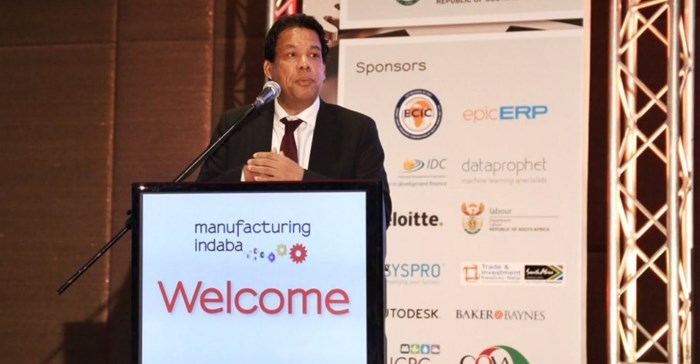Manufacturing is an indispensable sector if South Africa is to achieve its economic growth targets in future. While the country has been through a difficult period, government is confident that its new leadership has signalled a new dawn for the economy.

Lionel October
This is according to the Department of Trade and Industry (the dti) director general (DG) Lionel October, who delivered the keynote on the second day of the Manufacturing Indaba that took place at the Sandton Convention Centre recently.
The DG referred to the Industrial Policy Action Plan (IPAP), which is in its 10 annual iteration this year. “The IPAP 2018 also makes the point that the deep-seated structural problems in the domestic economy have remained stubbornly in place,” he says.
However, he adds, this must also be viewed in conjunction with the condition the first IPAP faced, that is the global financial crisis, whose effects rippled through our economy from 2009 onwards, affecting manufacturing particularly severely.
“This was compounded by the tapering of the commodity super-cycle and a sharp fall in demand for commodities as global recovery continued to falter and China adjusted by rebalancing its policy towards enhanced domestic demand.”
As a result, and during this time, the economy shed one million jobs, of which 320,000 were from the manufacturing sector. “The industry’s total GDP contribution declined from 15% to 13%, (a trend experienced by many developed and developing countries),” he adds.
Four-fold export growth
Since then, over the 10-year IPAP period, while imports have doubled, manufactured exports have grown four-fold – mainly dominated by metals, metal products, machinery and equipment, including capital equipment and mining machinery and equipment.
It is for this reason that the IPAP 2018 is premised on the principle that the ongoing effort to reindustrialise SA must rest on the need for deep-seated structural reform,” he says.
At an operational level, IPAP 2018 will focus 10 key themes, which inform the work of the Department of Trade and Industry and act as a roadmap for the wider industrial effort.
Fourth Industrial Revolution
Turning his attention to the Fourth Industrial Revolution/digital transformation, the DG says it is important that this and previous Manufacturing Indaba’s have placed emphasis on this matter and suggested approaching the phenomenon from two vantage points – the one a technological the other a policy and regulatory framework.
“From a technological standpoint we can all agree that seismic technological advances are already and will in future have a massive disruptive effect on our economy across the mining, agriculture, manufacturing and services sectors – additive manufacturing; digital transformation, computing; the internet of things and massive advances in production capabilities and systems,” he states.
Government has already put in place interventions to support this effort. “Two examples would be the Product Life Cycle Management Facility, which has been put in place at the CSIR, and secondly the extent to which the dti has revamped and scaled up the National Tooling Initiative now called Future Production Technologies to support the foundry, tooling and other sectors,” he explains.
Regulatory and policy framework
However, this matter also must be examined, he adds, most importantly from a regulatory and policy framework perspective. “For example, the European Union have moved with speed to ensure that issues of data security and concentration and competition issues are dealt with.”
Given the importance of this issue, he says the dti has assembled a task team, which is developing a policy and regulatory framework for digital transformation. “When this work has been completed the dti will put in place a process to ensure that the country’s policy and regulatory framework is fit for purpose to maximise the opportunities and withstand the challenges and threats which will be presented by the Fourth Industrial revolution,” he adds.
This will include engagement with the private sector and labour.
The DG acknowledges the Manufacturing Indaba as the premier event for the manufacturing sector on the annual calendar of which the dti is a proud partner. “We need to ensure that government works with private sector to make the Manufacturing Indaba an even more prestigious event,” he concludes.









































